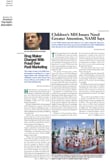The brain's bastion of memory—the hippocampus—is known to be small not only in persons with major depression, posttraumatic stress disorder, and Alzheimer's disease, but also in individuals with schizophrenia.
Yet how might a diminutive hippocampus relate to memory problems in schizophrenia?
Perhaps by making it difficult for schizophrenia patients to recognize novel items, a new study suggests. The study was headed by Anthony Weiss, M.D., a psychiatrist specializing in brain imaging at Massachusetts General Hospital in Boston. Results are in press with Biological Psychiatry.
During the past few years, investigators have reported that persons with schizophrenia have small hippocampal volumes and that they have certain memory difficulties. Weiss and his team assessed whether a small hippocampus might be associated with memory problems in schizophrenia.
Their subjects were 15 chronically ill schizophrenia patients and 16 age-matched control subjects. All of the schizophrenia subjects were being treated with antipsychotic medications, but most evidence to date suggests that antipsychotic medications have little impact on memory. Also, structural changes in the hippocampus have been noted from the earliest stages of psychosis, suggesting that they are not caused by antipsychotic drugs.
First, Weiss and his team used high-resolution magnetic resonance imaging (MRI) to measure hippocampal size in their schizophrenia and control subjects. They found that the hippocampus in both the left and right hemispheres of the brain was significantly smaller in the schizophrenia subjects than in the controls.
Word Recognition Assessed
Then the researchers gave the subjects a word-recognition task and used functional magnetic resonance imaging (fMRI) to see how the subjects' hippocampi responded during this task.
Both the schizophrenia subjects and the control subjects performed similarly on this task, and their hippocampi did, too—that is, there was considerable activation of the hippocampus in both the left and right hemispheres of the brain in both subject groups during this memory task.
Then the investigators gave the subjects a task in which they had to determine which words they had seen before and which they had not. Again fMRI was used to assess the activity of their hippocampi during the task. But this time, the schizophrenia subjects did not perform the task as well as the controls, having a greater tendency to indicate that they had seen an item not previously presented. Also, whereas the right hippocampus of the control subjects was activated during the task, the right hippocampus of the schizophrenia subjects was not.
Finally, the researchers examined the relationship between decreased hippocampal volume, impaired memory performance, and abnormal hippocampal function in the schizophrenia subjects. As they pointed out in their study report, they made an “intriguing finding—the volume of the right hippocampus was inversely correlated with the false-alarm rate in the schizophrenia group.” Also, they added, “these findings are consistent with previous work in patients with schizophrenia indicating heightened rates of false alarms during tests of verbal memory.”
Memory Difficulties Vary
Two conclusions can be drawn from these findings, Weiss and his team believe. For one, even though schizophrenia patients have a small hippocampal volume, it does not seem to lead to across-the-board memory difficulties. Nonetheless, having a small hippocampus does appear to make it difficult for schizophrenia patients to recognize novel items.
The study was funded by the National Institute of Mental Health, Mental Illness and Neuroscience Discovery Institute, and National Alliance for Research on Schizophrenia and Depression Young Investigator Awards. ▪
